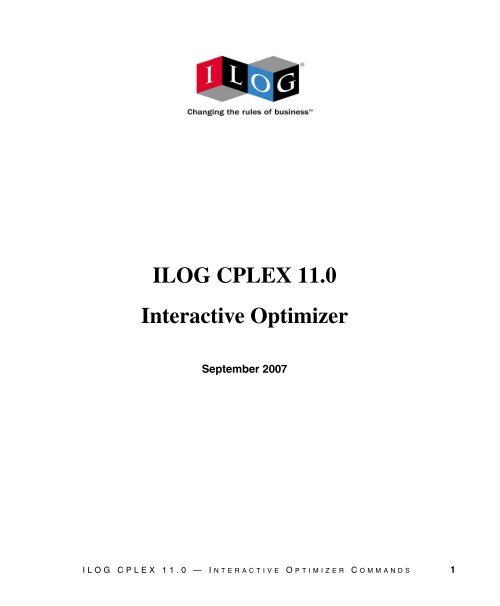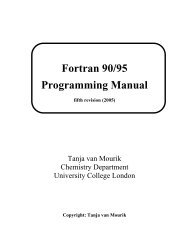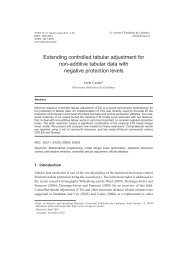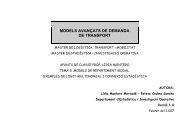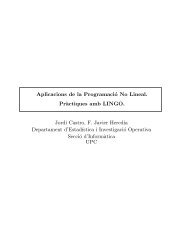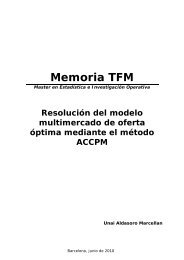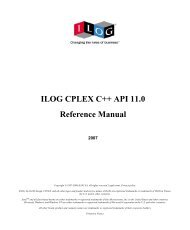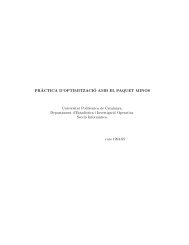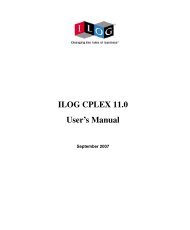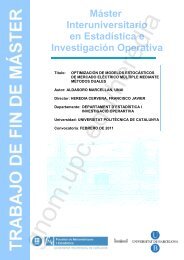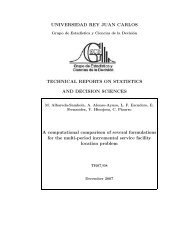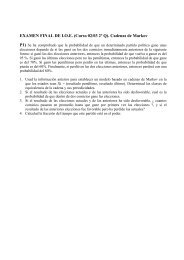ILOG CPLEX 11.0 Interactive Optimizer
ILOG CPLEX 11.0 Interactive Optimizer
ILOG CPLEX 11.0 Interactive Optimizer
You also want an ePaper? Increase the reach of your titles
YUMPU automatically turns print PDFs into web optimized ePapers that Google loves.
<strong>ILOG</strong> <strong>CPLEX</strong> <strong>11.0</strong><br />
<strong>Interactive</strong> <strong>Optimizer</strong><br />
September 2007<br />
<strong>ILOG</strong> <strong>CPLEX</strong> <strong>11.0</strong> — INTERACTIVE OPTIMIZER COMMANDS 1
COPYRIGHT NOTICE<br />
Copyright © 1987-2007, by <strong>ILOG</strong> S.A. and <strong>ILOG</strong>, Inc. All rights reserved.<br />
General Use Restrictions<br />
This document and the software described in this document are the property of <strong>ILOG</strong> and<br />
are protected as <strong>ILOG</strong> trade secrets. They are furnished under a license or nondisclosure<br />
agreement, and may be used or copied only within the terms of such license or nondisclosure<br />
agreement.<br />
No part of this work may be reproduced or disseminated in any form or by any means,<br />
without the prior written permission of <strong>ILOG</strong> S.A, or <strong>ILOG</strong>, Inc.<br />
Trademarks<br />
<strong>ILOG</strong>, the <strong>ILOG</strong> design, <strong>CPLEX</strong>, and all other logos and product and service names of<br />
<strong>ILOG</strong> are registered trademarks or trademarks of <strong>ILOG</strong> in France, the U.S. and/or other<br />
countries.<br />
All other company and product names are trademarks or registered trademarks of their<br />
respective holders.<br />
Java and all Java-based marks are either trademarks or registered trademarks of Sun<br />
Microsystems, Inc. in the United States and other countries.<br />
Microsoft and Windows are either trademarks or registered trademarks of Microsoft<br />
Corporation in the United States and other countries.<br />
document version <strong>11.0</strong><br />
2 <strong>ILOG</strong> <strong>CPLEX</strong> <strong>11.0</strong> — INTERACTIVE OPTIMIZER COMMANDS
C O N T E N T S<br />
Table of Contents<br />
<strong>ILOG</strong> <strong>CPLEX</strong> <strong>11.0</strong> <strong>Interactive</strong> <strong>Optimizer</strong><br />
<strong>Interactive</strong> <strong>Optimizer</strong> Commands . . . . . . . . . . . . . . . . . . . . . . . . . . . . . . . . . . . . . . . . . . . . . . . . . . . 5<br />
Managing Parameters in the <strong>Interactive</strong> <strong>Optimizer</strong>. . . . . . . . . . . . . . . . . . . . . . . . . . . . . . . .17<br />
Saving a Parameter Specification File . . . . . . . . . . . . . . . . . . . . . . . . . . . . . . . . . . . . . . . . .18<br />
Index . . . . . . . . . . . . . . . . . . . . . . . . . . . . . . . . . . . . . . . . . . . . . . . . . . . . . . . . . . . . . . . . . . . . . . . . . . 21<br />
<strong>ILOG</strong> <strong>CPLEX</strong> <strong>11.0</strong> — INTERACTIVE OPTIMIZER COMMANDS 3
4 <strong>ILOG</strong> <strong>CPLEX</strong> <strong>11.0</strong> — INTERACTIVE OPTIMIZER COMMANDS
<strong>Interactive</strong> <strong>Optimizer</strong> Commands<br />
This manual lists the commands of the <strong>Interactive</strong> <strong>Optimizer</strong> of <strong>ILOG</strong> <strong>CPLEX</strong>. For an<br />
introduction to the <strong>Interactive</strong> <strong>Optimizer</strong>, see the manual Getting Started, especially the<br />
tutorial for the <strong>Interactive</strong> <strong>Optimizer</strong>.<br />
This manual begins with a table that lists <strong>Interactive</strong> <strong>Optimizer</strong> commands in alphabetic<br />
order with their primary options. For some commands, it also tells where examples of their<br />
use can be found in the <strong>ILOG</strong> <strong>CPLEX</strong> User’s Manual or Getting Started.<br />
These topics follow the table:<br />
◆ Managing Parameters in the <strong>Interactive</strong> <strong>Optimizer</strong> on page 17<br />
◆ Saving a Parameter Specification File on page 18<br />
<strong>Interactive</strong> <strong>Optimizer</strong> Command Options Example<br />
add<br />
baropt<br />
Adding Constraints and Bounds on page 60 in<br />
Getting Started<br />
Using Alternative <strong>Optimizer</strong>s on page 50 in Getting<br />
Started<br />
baropt<br />
dualopt<br />
<strong>ILOG</strong> <strong>CPLEX</strong> <strong>11.0</strong> — INTERACTIVE OPTIMIZER COMMANDS 5
<strong>Interactive</strong> <strong>Optimizer</strong> Commands<br />
<strong>Interactive</strong> <strong>Optimizer</strong> Command Options Example<br />
baropt<br />
baropt<br />
primopt<br />
stop<br />
change bounds Changing Bounds on page 63 in Getting Started<br />
change coefficient Changing Coefficients on page 64 in Getting<br />
Started<br />
change delete Deleting Entire Constraints or Variables on<br />
page 65 in Getting Started<br />
change delete constraints<br />
change delete qconstraints<br />
change delete indconstraints<br />
change delete sos<br />
change delete variables<br />
change delete equality<br />
change delete greater-than<br />
change delete less-than<br />
change name Changing Constraint or Variable Names on<br />
page 62 in Getting Started<br />
change objective Objective & RHS Coefficients on page 64 in<br />
Getting Started<br />
change problem type Using the MIP Solution on page 282<br />
Changing Problem Type in QPs on page 232<br />
Diagnosing QP Infeasibility on page 235 in<br />
User’s Manual<br />
change problem fixed i Accessing a Solution in the Solution Pool on<br />
page 316 in User’s Manual<br />
change qpterm Changing Quadratic Terms on page 233 in<br />
User’s Manual<br />
change rhs Objective & RHS Coefficients on page 64 in<br />
Getting Started<br />
change sense Changing Sense on page 63 in Getting Started<br />
6 <strong>ILOG</strong> <strong>CPLEX</strong> <strong>11.0</strong> — INTERACTIVE OPTIMIZER COMMANDS
<strong>Interactive</strong> <strong>Optimizer</strong> Command Options Example<br />
change type Changing Variable Type on page 260 in User’s<br />
Manual<br />
change values Changing Small Values to Zero on page 66 in<br />
Getting Started<br />
conflict<br />
Meet the Conflict Refiner in the <strong>Interactive</strong> <strong>Optimizer</strong><br />
on page 394 in User’s Manual<br />
display conflict all Displaying a Conflict in the <strong>Interactive</strong> <strong>Optimizer</strong><br />
on page 396 in User’s Manual<br />
display conflict constraints Displaying a Conflict in the <strong>Interactive</strong> <strong>Optimizer</strong><br />
on page 396 in User’s Manual<br />
display conflict indicators<br />
display conflict qconstraints<br />
display conflict sos<br />
display conflict variables Displaying a Conflict in the <strong>Interactive</strong> <strong>Optimizer</strong><br />
on page 396 in User’s Manual<br />
display problem all Displaying a Problem on page 42 in Getting<br />
Started<br />
display problem binaries <strong>Interactive</strong> <strong>Optimizer</strong> Display Options for MIP<br />
Problems on page 258 in User’s Manual<br />
display problem bounds Displaying Bounds on page 47 in Getting<br />
Started<br />
display problem constraints Displaying Constraints on page 46 in Getting<br />
Started<br />
display problem generals <strong>Interactive</strong> <strong>Optimizer</strong> Display Options for MIP<br />
Problems on page 258 in User’s Manual<br />
display problem histogram Detecting and Eliminating Dense Columns on<br />
page 210 in User’s Manual or Displaying a Histogram<br />
of NonZero Counts on page 47 in Getting<br />
Started<br />
display problem indicators<br />
display problem integers <strong>Interactive</strong> <strong>Optimizer</strong> Display Options for MIP<br />
Problems on page 258 in User’s Manual<br />
<strong>ILOG</strong> <strong>CPLEX</strong> <strong>11.0</strong> — INTERACTIVE OPTIMIZER COMMANDS 7
<strong>Interactive</strong> <strong>Optimizer</strong> Commands<br />
<strong>Interactive</strong> <strong>Optimizer</strong> Command Options Example<br />
display problem names Displaying Variable or Constraint Names on<br />
page 45 in Getting Started<br />
display problem qconstraints<br />
display problem qpvariables<br />
display problem semi-continuous<br />
display problem sos<br />
display problem stats Solve the Problem You Intended on page 142 or<br />
<strong>Interactive</strong> <strong>Optimizer</strong> Display Options for MIP<br />
Problems on page 258 in User’s Manual<br />
display problem variable<br />
display sensitivity lb Performing Sensitivity Analysis on page 52 in<br />
Getting Started<br />
display sensitivity objective Performing Sensitivity Analysis on page 52 in<br />
Getting Started<br />
display sensitivity rhs Performing Sensitivity Analysis on page 52 in<br />
Getting Started<br />
display sensitivity ub Performing Sensitivity Analysis on page 52 in<br />
Getting Started<br />
display settings Displaying Parameter Settings on page 60 in<br />
Getting Started<br />
display settings all Displaying Parameter Settings on page 60 in<br />
Getting Started<br />
display settings changed Displaying Parameter Settings on page 60 in<br />
Getting Started<br />
display solution basis<br />
display solution bestbound<br />
display solution difference i j Examining the Solution Pool on page 316 in<br />
User’s Manual<br />
display solution dual<br />
display solution kappa Measuring Problem Sensitivity with Basis Condition<br />
Number on page 187 in User’s Manual<br />
8 <strong>ILOG</strong> <strong>CPLEX</strong> <strong>11.0</strong> — INTERACTIVE OPTIMIZER COMMANDS
<strong>Interactive</strong> <strong>Optimizer</strong> Command Options Example<br />
display solution list i n Examining the Solution Pool on page 316 in<br />
User’s Manual<br />
display solution member Examining the Solution Pool on page 316 in<br />
User’s Manual<br />
display solution objective<br />
display solution pool Examining the Solution Pool on page 316 in<br />
User’s Manual<br />
display solution qcslacks<br />
display solution quality Coping with an Ill-Conditioned Problem or Handling<br />
Unscaled Infeasibilities on page 190 or<br />
Understanding Solution Quality from the Barrier<br />
LP <strong>Optimizer</strong> on page 205 in User’s Manual<br />
display solution reduced<br />
display solution slacks Displaying Post-Solution Information on page 51<br />
in Getting Started<br />
display solution variables Displaying Post-Solution Information on page 51<br />
in Getting Started<br />
display solution number i objective Examining the Solution Pool on page 316 in<br />
User’s Manual<br />
display solution number i qcslacks<br />
display solution number i quality<br />
display solution number i slacks<br />
display solution number i variables<br />
enter<br />
Entering a Problem on page 38 in Getting<br />
Started<br />
feasopt constraints Invoking FeasOpt on page 410 in User’s Manual<br />
feasopt variables Invoking FeasOpt on page 410 in User’s Manual<br />
feasopt all Invoking FeasOpt on page 410 in User’s Manual<br />
help<br />
Using Help on page 36 in Getting Started<br />
mipopt Using the Mixed Integer <strong>Optimizer</strong> on page 261<br />
in User’s Manual<br />
<strong>ILOG</strong> <strong>CPLEX</strong> <strong>11.0</strong> — INTERACTIVE OPTIMIZER COMMANDS 9
<strong>Interactive</strong> <strong>Optimizer</strong> Commands<br />
<strong>Interactive</strong> <strong>Optimizer</strong> Command Options Example<br />
netopt<br />
optimize<br />
populate<br />
primopt<br />
quit<br />
Example: Network <strong>Optimizer</strong> in the <strong>Interactive</strong><br />
<strong>Optimizer</strong> on page 219 or<br />
CPX_ALG_HYBNETOPT on page 298 in User’s<br />
Manual<br />
Solving a Problem on page 48 in Getting<br />
Started<br />
Populating the Solution Pool on page 306 in<br />
User’s Manual<br />
Using Alternative <strong>Optimizer</strong>s on page 50 in Getting<br />
Started<br />
Quitting <strong>ILOG</strong> <strong>CPLEX</strong> on page 67 in Getting<br />
Started<br />
read filename type Starting from an Advanced Basis on page 178<br />
or Understanding the Network Log File on<br />
page 220 or Filter Files on page 326 in User’s<br />
Manual<br />
set advance Starting from an Advanced Basis on page 178<br />
in User’s Manual<br />
set barrier Using the Barrier <strong>Optimizer</strong> on page 200 in<br />
User’s Manual<br />
set barrier algorithm Using the Barrier <strong>Optimizer</strong> on page 200 or<br />
Choosing an Ordering Algorithm on page 210 in<br />
User’s Manual<br />
set barrier colnonzeros Detecting and Eliminating Dense Columns on<br />
page 210 in User’s Manual<br />
set barrier convergetol<br />
set barrier crossover<br />
set barrier display level Using the Barrier <strong>Optimizer</strong> on page 200 or<br />
Numeric Instability Due to Elimination of Too<br />
Many Dense Columns on page 214 in User’s<br />
Manual<br />
set barrier limits corrections Change the Limit on Barrier Corrections on<br />
page 213 in User’s Manual<br />
set barrier limits growth<br />
10 <strong>ILOG</strong> <strong>CPLEX</strong> <strong>11.0</strong> — INTERACTIVE OPTIMIZER COMMANDS
<strong>Interactive</strong> <strong>Optimizer</strong> Command Options Example<br />
set barrier limits iterations<br />
set barrier limits objrange Difficulties with Unbounded Problems on<br />
page 215 in User’s Manual<br />
set barrier limits threads<br />
set barrier ordering<br />
set barrier qcpconvergetol<br />
set barrier startalg<br />
set<br />
clocktype<br />
set conflict display level<br />
set defaults Resetting Defaults on page 60 in Getting<br />
Started<br />
set emphasis memory Lack of Memory on page 183 or Memory<br />
Emphasis: Letting the <strong>Optimizer</strong> Use Disk for<br />
Storage on page 208 in User’s Manual<br />
set emphasis mip Emphasizing Feasibility and Optimality on<br />
page 261 in User’s Manual<br />
set emphasis numerical Numerical Emphasis Settings on page 185 (LP)<br />
or Numerical Emphasis Settings on page 212<br />
(barrier) in User’s Manual<br />
set feasopt tolerance<br />
set logfile filename Filing Iteration Logs on page 50 in Getting<br />
Started<br />
set<br />
lpmethod<br />
set mip cuts all<br />
set mip cuts class Parameters for Controlling Cuts on page 274 in<br />
User’s Manual<br />
set mip cuts cliques<br />
set mip cuts covers<br />
set mip cuts disjunctive<br />
set mip cuts flowcovers<br />
<strong>ILOG</strong> <strong>CPLEX</strong> <strong>11.0</strong> — INTERACTIVE OPTIMIZER COMMANDS 11
<strong>Interactive</strong> <strong>Optimizer</strong> Commands<br />
<strong>Interactive</strong> <strong>Optimizer</strong> Command Options Example<br />
set mip cuts gomory<br />
set mip cuts gubcovers<br />
set mip cuts implied<br />
set mip cuts mircut<br />
set mip cuts pathcut<br />
set mip display<br />
set mip interval<br />
set mip limits aggforcut<br />
set mip limits cutpasses<br />
set mip limits cutsfactor Parameters Affecting Cuts on page 274 in<br />
User’s Manual<br />
set mip limits gomorycand<br />
set mip limits gomorypass<br />
set mip limits nodes Parameters to Limit MIP Optimization on<br />
page 264 in User’s Manual<br />
set mip limits polishtime<br />
set mip limits populate Parameters of the Solution Pool on page 321 in<br />
User’s Manual<br />
set mip limits probetime<br />
set mip limits repairtries<br />
set mip limits solutions Parameters to Limit MIP Optimization on<br />
page 264 in User’s Manual<br />
set mip limits strongcand<br />
set mip limits strongit<br />
set mip limits strongthreads<br />
set mip limits submipnodelim<br />
set mip limits threads<br />
12 <strong>ILOG</strong> <strong>CPLEX</strong> <strong>11.0</strong> — INTERACTIVE OPTIMIZER COMMANDS
<strong>Interactive</strong> <strong>Optimizer</strong> Command Options Example<br />
set mip limits treememory Reset the Tree Memory Parameter on page 293<br />
in User’s Manual<br />
set mip ordtype<br />
set mip pool absgap Parameters of the Solution Pool on page 321 in<br />
User’s Manual<br />
set mip pool capacity Parameters of the Solution Pool on page 321 in<br />
User’s Manual<br />
set mip pool intensity Parameters of the Solution Pool on page 321 in<br />
User’s Manual<br />
set mip pool relgap Parameters of the Solution Pool on page 321 in<br />
User’s Manual<br />
set mip pool replace Parameters of the Solution Pool on page 321 in<br />
User’s Manual<br />
set mip strategy backtrack Parameters for Controlling Branch & Cut Strategy<br />
on page 267 in User’s Manual<br />
set mip strategy bbinterval Parameters for Controlling Branch & Cut Strategy<br />
on page 267 in User’s Manual<br />
set mip strategy branch Parameters for Controlling Branch & Cut Strategy<br />
on page 267 in User’s Manual<br />
set mip strategy dive<br />
set mip strategy file<br />
set mip strategy heuristicfreq Heuristics on page 275 in User’s Manual<br />
set mip strategy lbheuristic<br />
set mip strategy nodeselect Parameters for Controlling Branch & Cut Strategy<br />
on page 267 in User’s Manual<br />
set mip strategy order<br />
set mip strategy presolvenode<br />
set mip strategy probe Probing on page 270 in User’s Manual<br />
set mip strategy rinsheur relaxation induced neighborhood search (RINS)<br />
set mip strategy startalgorithm<br />
<strong>ILOG</strong> <strong>CPLEX</strong> <strong>11.0</strong> — INTERACTIVE OPTIMIZER COMMANDS 13
<strong>Interactive</strong> <strong>Optimizer</strong> Commands<br />
<strong>Interactive</strong> <strong>Optimizer</strong> Command Options Example<br />
set mip strategy subalgorithm NodeAlg Parameter on page 298 in User’s Manual<br />
set mip strategy variableselect Parameters for Controlling Branch & Cut Strategy<br />
on page 267 in User’s Manual<br />
set mip tolerances absmipgap<br />
set mip tolerances integrality<br />
set mip tolerances lowercutoff<br />
set mip tolerances mipgap<br />
set mip tolerances objdifference Time Wasted on Overly Tight Optimality Criteria<br />
on page 291 in User’s Manual<br />
set mip tolerances relobjdifference<br />
set mip tolerances uppercutoff<br />
set network display Understanding the Network Log File on<br />
page 220 in User’s Manual<br />
set network iterations Limiting Iterations in the Network <strong>Optimizer</strong> on<br />
page 221 in User’s Manual<br />
set network netfind<br />
set network pricing Selecting a Pricing Algorithm for the Network<br />
<strong>Optimizer</strong> on page 221 in User’s Manual<br />
set network tolerances feasibility Controlling Tolerance on page 221 in User’s<br />
Manual<br />
set network tolerances optimality<br />
set output channel<br />
set output mpslong<br />
set output logonly Interpreting Solution Quality on page 191 in<br />
User’s Manual<br />
set parallel mode Using Parallel <strong>Optimizer</strong>s in the <strong>Interactive</strong> <strong>Optimizer</strong><br />
on page 494 in User’s Manual<br />
14 <strong>ILOG</strong> <strong>CPLEX</strong> <strong>11.0</strong> — INTERACTIVE OPTIMIZER COMMANDS
<strong>Interactive</strong> <strong>Optimizer</strong> Command Options Example<br />
set preprocessing aggregator Preprocessing on page 176<br />
Preprocessing and Memory Requirements on<br />
page 184<br />
Parameters for Controlling MIP Preprocessing<br />
on page 278 in User’s Manual<br />
set preprocessing boundstrength Parameters for Controlling MIP Preprocessing<br />
on page 278 in User’s Manual<br />
set preprocessing coeffreduce Parameters for Controlling MIP Preprocessing<br />
on page 278<br />
Examples: Optimizing a Simple MIP Problem on<br />
page 299 in User’s Manual<br />
set preprocessing dependency Preprocessing on page 176 (continuous)<br />
Preprocessing on page 209 (discrete) in User’s<br />
Manual<br />
set preprocessing dual Using a Starting-Point Heuristic on page 211 in<br />
User’s Manual<br />
set preprocessing fill Preprocessing on page 176 in User’s Manual<br />
set preprocessing linear<br />
set preprocessing numpass<br />
set preprocessing presolve Preprocessing and Memory Requirements on<br />
page 184 (continuous) in User’s Manual<br />
Parameters for Controlling MIP Preprocessing<br />
on page 278 in User’s Manual<br />
set preprocessing qpmakepsd<br />
set preprocessing reduce Preprocessing on page 176 (continuous) or<br />
Preprocessing and Feasibility on page 385 (discrete)<br />
in User’s Manualp<br />
set preprocessing relax Parameters for Controlling MIP Preprocessing<br />
on page 278 in User’s Manual<br />
set preprocessing repeatpresolve Preprocessing: Presolver and Aggregator on<br />
page 277 (discrete) in User’s Manual<br />
set preprocessing symmetry<br />
set<br />
qpmethod<br />
set read constraints<br />
<strong>ILOG</strong> <strong>CPLEX</strong> <strong>11.0</strong> — INTERACTIVE OPTIMIZER COMMANDS 15
<strong>Interactive</strong> <strong>Optimizer</strong> Commands<br />
<strong>Interactive</strong> <strong>Optimizer</strong> Command Options Example<br />
set read datacheck Displaying Problem Statistics on page 43 in Getting<br />
Started<br />
set read nonzeroes<br />
set read qpnonzeroes<br />
set read scale Scaling on page 181 in User’s Manual<br />
set read variables<br />
set sifting algorithm<br />
set sifting display<br />
set sifting iterations<br />
set simplex crash CraInd Parameter Settings for the Primal Simplex<br />
<strong>Optimizer</strong> on page 183 in User’s Manual<br />
set simplex dgradient<br />
set simplex display<br />
set simplex limits iterations<br />
set simplex limits lowerobj<br />
set simplex limits perturbation Stalling Due to Degeneracy on page 188 in<br />
User’s Manual<br />
set simplex limits singularity Repeated Singularities on page 188 in User’s<br />
Manual<br />
set simplex limits upperobj<br />
set simplex perturbation Stalling Due to Degeneracy on page 188 in<br />
User’s Manual<br />
set simplex pgradient<br />
set simplex pricing<br />
set simplex refactor Refactoring Frequency and Memory Requirements<br />
on page 184 in User’s Manual<br />
set simplex tolerances feasibility Maximum Bound Infeasibility: Identifying Largest<br />
Bound Violation on page 192 in User’s Manual<br />
16 <strong>ILOG</strong> <strong>CPLEX</strong> <strong>11.0</strong> — INTERACTIVE OPTIMIZER COMMANDS
Managing Parameters in the <strong>Interactive</strong> <strong>Optimizer</strong><br />
<strong>Interactive</strong> <strong>Optimizer</strong> Command Options Example<br />
set simplex tolerances markowitz Inability to Stay Feasible on page 189 in User’s<br />
Manual<br />
set simplex tolerances optimality Maximum Reduced-Cost Infeasibility on<br />
page 192 in User’s Manual<br />
set<br />
threads<br />
set timelimit Parameters to Limit MIP Optimization on<br />
page 264 in User’s Manual<br />
set workdir prompt for directory Memory Emphasis: Letting the <strong>Optimizer</strong> Use<br />
Disk for Storage on page 208 in User’s Manual<br />
set workmem prompt for new value of<br />
working memory<br />
available<br />
Memory Emphasis: Letting the <strong>Optimizer</strong> Use<br />
Disk for Storage on page 208 or Parameters to<br />
Limit MIP Optimization on page 264 in User’s<br />
Manual<br />
tranopt<br />
tune display i Tuning Tool on page 161 in User’s Manual<br />
tune filenames parameterfile.prm Example: Time Limits on Tuning in the <strong>Interactive</strong><br />
<strong>Optimizer</strong> on page 163 and Fixing Parameters<br />
and Tuning Multiple Models in the<br />
<strong>Interactive</strong> <strong>Optimizer</strong> on page 164 in User’s<br />
Manual<br />
write filenames type Preprocessing on page 176 (continuous) or<br />
Repeated Singularities on page 188 or<br />
Difficulty Solving Subproblems: Overcoming<br />
Degeneracy on page 297 or<br />
Saving QP Problems on page 232 in User’s<br />
Manual<br />
xecute command Executing Operating System Commands on<br />
page 66 in Getting Started<br />
Managing Parameters in the <strong>Interactive</strong> <strong>Optimizer</strong><br />
To see the current value of a parameter that interests you in the <strong>Interactive</strong> <strong>Optimizer</strong>, use the<br />
command display settings. The command display settings changed lists only<br />
those parameters where the value is not the default value. The command<br />
display settings all lists all parameters and their values.<br />
<strong>ILOG</strong> <strong>CPLEX</strong> <strong>11.0</strong> — INTERACTIVE OPTIMIZER COMMANDS 17
<strong>Interactive</strong> <strong>Optimizer</strong> Commands<br />
To change the value of a parameter in the <strong>Interactive</strong> <strong>Optimizer</strong>, use the command set<br />
followed by options to indicate the parameter and the value you want it to assume.<br />
In the reference manual of <strong>ILOG</strong> <strong>CPLEX</strong> Parameters, you will find the name of each<br />
parameter and its options in the <strong>Interactive</strong> <strong>Optimizer</strong>, along with the name of the parameter<br />
in Concert Technology and the Callable Library. That manual also describes the purpose of<br />
each parameter and documents its possible settings.<br />
In the reference manual of the <strong>ILOG</strong> <strong>CPLEX</strong> Callable Library, the group<br />
optim.cplex.manageparameters documents the Callable Library routines that access<br />
parameters.<br />
Saving a Parameter Specification File<br />
You can tell the <strong>ILOG</strong> <strong>CPLEX</strong> <strong>Interactive</strong> <strong>Optimizer</strong> to read customized parameter settings<br />
from a parameter specification file. By default, <strong>ILOG</strong> <strong>CPLEX</strong> expects a parameter<br />
specification file to be named cplex.par, and it looks for that file in the directory where it<br />
is executing. However, you can rename the file, or tell <strong>ILOG</strong> <strong>CPLEX</strong> to look for it in another<br />
directory by setting the system environment variable <strong>CPLEX</strong>PARFILE to the full path name<br />
of your parameter specification file. You set that environment variable in the customary way<br />
for your platform. For example, on a UNIX platform, you might use a shell command to set<br />
the environment variable, or on a personal computer running Microsoft Windows, you might<br />
click on the System icon in the control panel, then select the environment tab from the<br />
available system properties tabs, and then define the variable there.<br />
During initialization in the <strong>Interactive</strong> <strong>Optimizer</strong>, <strong>ILOG</strong> <strong>CPLEX</strong> locates any available<br />
parameter specification file (by checking the current execution directory for cplex.par and<br />
by checking the environment variable <strong>CPLEX</strong>PARFILE) and reads that file. As it opens the<br />
file, <strong>ILOG</strong> <strong>CPLEX</strong> displays the message “Initial parameter values are being read from<br />
cplex.par” (or from the parameter specification file you specified). As <strong>ILOG</strong> <strong>CPLEX</strong><br />
displays that message on the screen, it also writes the message to the log file. If<br />
<strong>ILOG</strong> <strong>CPLEX</strong> cannot open the file, it displays no message, records no note in the log file,<br />
and uses default parameter settings.<br />
You can use a parameter specification file to change any parameter or parameters accessible<br />
by the set command in the <strong>Interactive</strong> <strong>Optimizer</strong>. The parameter types, names, and options<br />
are those used by the set command in the <strong>Interactive</strong> <strong>Optimizer</strong>.<br />
To create a parameter specification file, you can use either of these alternatives:<br />
◆ Use an ordinary text editor to create a file where each line observes the following syntax:<br />
parameter-name option value<br />
18 <strong>ILOG</strong> <strong>CPLEX</strong> <strong>11.0</strong> — INTERACTIVE OPTIMIZER COMMANDS
Saving a Parameter Specification File<br />
◆<br />
Use the command display settings in the <strong>Interactive</strong> <strong>Optimizer</strong> to generate a list of<br />
current parameter settings. Those settings will be recorded in the log file. You can then<br />
edit the log file with your preferred text editor to create your parameter specification file.<br />
display settings changed lists parameters different from the default with their<br />
values.<br />
display settings all lists all parameters with their values.<br />
Each entry on a line must be separated by at least one space or tab. Blank lines in a<br />
parameter specification file are acceptable; there are no provisions for comments in the file.<br />
You may abbreviate parameter names to unique character sequences, as you do in the set<br />
command.<br />
As <strong>ILOG</strong> <strong>CPLEX</strong> reads a parameter specification file, if the parameter name and value are<br />
valid, <strong>ILOG</strong> <strong>CPLEX</strong> sets the parameter and writes a message about it to the screen and to the<br />
log file. If <strong>ILOG</strong> <strong>CPLEX</strong> encounters a repeated parameter, it uses the last value specified.<br />
<strong>ILOG</strong> <strong>CPLEX</strong> terminates under the following conditions:<br />
◆<br />
◆<br />
if it encounters a parameter that is unknown;<br />
if it encounters a parameter that is not unique;<br />
◆ if the parameter is correctly specified but the value is missing, invalid, or out of range.<br />
Here is an example of a parameter specification file that tells <strong>ILOG</strong> <strong>CPLEX</strong> to use wall<br />
clock rather than CPU time while limiting total run time to 60 seconds. It also instructs<br />
<strong>ILOG</strong> <strong>CPLEX</strong> to open a log file named problem.log.<br />
clocktype 2<br />
timelimit 60<br />
logfile problem.log<br />
<strong>ILOG</strong> <strong>CPLEX</strong> <strong>11.0</strong> — INTERACTIVE OPTIMIZER COMMANDS 19
<strong>Interactive</strong> <strong>Optimizer</strong> Commands<br />
20 <strong>ILOG</strong> <strong>CPLEX</strong> <strong>11.0</strong> — INTERACTIVE OPTIMIZER COMMANDS
I N D E X<br />
Index<br />
A<br />
accessing parameters in <strong>Interactive</strong> <strong>Optimizer</strong> 17<br />
aggregator 15<br />
B<br />
barrier optimizer 5, 10<br />
convergence tolerance 10<br />
corrections limit 10<br />
crossover 10<br />
dense columns and 10<br />
display levels in 10<br />
dual 5<br />
growth limit 10<br />
iteration limit 11<br />
objective range limit 11<br />
ordering 11<br />
primal 6<br />
QCP convergence tolerance 11<br />
starting algorithm 11<br />
thread limit 11<br />
basis<br />
displaying 8<br />
setting advanced 10<br />
binary variable, displaying 7<br />
bound<br />
changing 6<br />
displaying 7<br />
displaying best 8<br />
bound strength 15<br />
C<br />
changing<br />
bounds 6<br />
coefficients 6<br />
names 6<br />
objective 6<br />
problem type 6<br />
QP term 6<br />
righthand side (RHS) 6<br />
sense 6<br />
variable type 7<br />
channel, output 14<br />
clock type 11<br />
coefficient, changing 6<br />
conflict 7<br />
constraint<br />
displaying 7<br />
reading 15<br />
conventions in parameter specification file 19<br />
cplex.par parameter specification file 18<br />
<strong>CPLEX</strong>PARFILE environment variable 18<br />
creating parameter specification file 18<br />
D<br />
dense column<br />
barrier and 10<br />
<strong>ILOG</strong> <strong>CPLEX</strong> <strong>11.0</strong> — INTERACTIVE OPTIMIZER COMMANDS 21
histogram of 7<br />
diagnosing infeasibility 7<br />
directory, setting 17<br />
displaying<br />
basis 8<br />
best bounds 8<br />
binary variables 7<br />
dual solution 8<br />
general variables 7<br />
histogram 7<br />
integer variables 7<br />
kappa 8<br />
lower bound sensitivity 8<br />
names 8<br />
network optimizer 14<br />
objective 9<br />
objective sensitivity 8<br />
parameter settings 17, 19<br />
problem 7<br />
problem bounds 7<br />
problem constraints 7<br />
problem statistics 8<br />
problem variables 8<br />
QP variables 8<br />
RHS sensitivity 8<br />
semi-continuous variables 8<br />
settings 8<br />
sifting 16<br />
simplex 16<br />
slack 9<br />
slacks in QCP 9<br />
solution variables 9<br />
special ordered set (SOS) 8<br />
upper bound sensitivity 8<br />
E<br />
environment<br />
parameter specification file 19<br />
variable 18<br />
example parameter specification file 19<br />
F<br />
feasopt 9<br />
feasopt tolerance 11<br />
H<br />
help 9<br />
histogram 7<br />
I<br />
integer variable, displaying 7<br />
<strong>Interactive</strong> <strong>Optimizer</strong><br />
accessing parameters in 17<br />
commands 5 to 17<br />
customized parameter settings 18<br />
setting parameters 18<br />
K<br />
kappa 8<br />
L<br />
log file 11<br />
parameter specifications and 18<br />
M<br />
memory, setting 17<br />
MIP<br />
aggregation limit 12<br />
backtracking strategy 13<br />
branch and bound interval 13<br />
branch and cut strategy 13<br />
cliques and 11<br />
covers and 11<br />
cut factor limit 12<br />
cut passes limit 12<br />
cuts and 11<br />
disjunctive cuts 11<br />
dive strategy 13<br />
emphasis 11<br />
file strategy 13<br />
flow cuts 11<br />
Gomory cut candidate limit 12<br />
Gomory cut pass limit 12<br />
22 <strong>ILOG</strong> <strong>CPLEX</strong> <strong>11.0</strong> — INTERACTIVE OPTIMIZER COMMANDS
Gomory cuts 12<br />
GUB covers 12<br />
heuristic frequency 13<br />
implied cuts 12<br />
interval 12<br />
lb heuristic strategy 13<br />
memory limit for tree 13<br />
MIR cuts 12<br />
node algorithm 14<br />
node limit 12<br />
node selection strategy 13<br />
order strategy 13<br />
path cuts 12<br />
polishing time limit 12<br />
presolve at nodes 13<br />
probe strategy 13<br />
probe time limit 12<br />
repair try limit 12<br />
RINS strategy 13<br />
solution limit 12<br />
solution pool limit 12<br />
starting algorithm 13<br />
strong candidate limit 12<br />
strong iteration limit 12<br />
strong thread limit 12<br />
subalgorithm 14<br />
subnode limit 12<br />
thread limit 12<br />
tolerance<br />
absolute gap 14<br />
gap 14<br />
integrality 14<br />
lower cut off 14<br />
objective difference 14<br />
relative objective difference 14<br />
upper cut off 14<br />
variable selection strategy 14<br />
MPS controlling precision of output 14<br />
N<br />
name<br />
changing 6<br />
displaying 8<br />
network optimizer<br />
O<br />
displaying 14<br />
iterations 14<br />
pricing 14<br />
tolerance<br />
feasibility 14<br />
optimality 14<br />
objective<br />
changing 6<br />
displaying 9<br />
displaying sensitivity 8<br />
optimality tolerance 17<br />
optimize command 10<br />
output<br />
controlling precision in MPS, REW files 14<br />
directing to log file 14<br />
setting channel for 14<br />
output channel 14<br />
P<br />
parallel mode 14<br />
parameter<br />
customized 18<br />
setting 18<br />
specification file 18<br />
parameter specification file 18, 19<br />
creating 18<br />
example 19<br />
syntax in 19<br />
parameter tuning 17<br />
performance tuning 17<br />
displaying results 17<br />
perturbation 16<br />
populate command 10<br />
preprocessing 15<br />
aggregator 15<br />
bound strength 15<br />
coefficient reduction 15<br />
dependency 15<br />
dual 15<br />
fill 15<br />
linearity 15<br />
<strong>ILOG</strong> <strong>CPLEX</strong> <strong>11.0</strong> — INTERACTIVE OPTIMIZER COMMANDS 23
positive semi-definite 15<br />
presolve and 15<br />
QP and PSD 15<br />
re-apply presolve after root 15<br />
reductions 15<br />
relaxation 15<br />
symmetry breaking 15<br />
problem<br />
changing type 6<br />
displaying 7<br />
Q<br />
QCP<br />
barrier convergence tolerance and 11<br />
QP 15<br />
changing term in 6<br />
displaying variables 8<br />
reading non zeroes 16<br />
quality, displaying solution 9<br />
quit command 10<br />
R<br />
read command 10<br />
reading<br />
constraints 15<br />
data 16<br />
non zeroes 16<br />
non zeroes in QP 16<br />
scaling and 16<br />
variables 16<br />
relaxation induced neighborhood search (RINS) 13<br />
righthand side (RHS), changing 6<br />
S<br />
saving parameter specification file 18<br />
semi-continuous variable<br />
displaying 8<br />
sense, changing 6<br />
sensitivity<br />
displaying lower bound 8<br />
displaying objective 8<br />
displaying RHS 8<br />
displaying upper bound 8<br />
set <strong>Interactive</strong> <strong>Optimizer</strong> command 18<br />
setting<br />
customized parameters 18<br />
output channel 14<br />
parameter specification file 18<br />
parameters 18<br />
sifting<br />
algorithm for 16<br />
displaying 16<br />
iterations and 16<br />
simplex<br />
crash indicator 16<br />
displaying 16<br />
dual gradient 16<br />
iteration limit 16<br />
lower objective limit 16<br />
perturbation limit 16<br />
perturbing 16<br />
pricing 16<br />
primal gradient 16<br />
refactoring frequency 16<br />
singularity limit 16<br />
tolerance<br />
feasibility 16<br />
Markowitz 17<br />
optimality 17<br />
upper objective limit 16<br />
slack<br />
displaying 9<br />
displaying in <strong>Interactive</strong> <strong>Optimizer</strong> 9<br />
displaying in QCP 9<br />
solution pool<br />
absolute gap and 13<br />
capacity of 13<br />
intensity 13<br />
relative gap and 13<br />
replacement strategy 13<br />
solution, displaying quality of 9<br />
special ordered set (SOS)<br />
displaying 8<br />
statistics, displaying for problem 8<br />
24 <strong>ILOG</strong> <strong>CPLEX</strong> <strong>11.0</strong> — INTERACTIVE OPTIMIZER COMMANDS
T<br />
threads 17<br />
time limit 17<br />
tolerance<br />
MIP<br />
absolute gap 14<br />
gap 14<br />
integrality 14<br />
lower cut off 14<br />
objective difference 14<br />
relative objective difference 14<br />
upper cut off 14<br />
network optimizer<br />
feasibility 14<br />
optimality 14<br />
simplex<br />
feasibility 16<br />
optimality 17<br />
tuning 17<br />
displaying results 17<br />
V<br />
variable<br />
binary, displaying 7<br />
changing type of 7<br />
displaying 8<br />
displaying general 7<br />
displaying in solution 9<br />
displaying QP 8<br />
displaying semi-continuous 8<br />
W<br />
working directory 17<br />
working memory 17<br />
writing files 17<br />
X<br />
xecute command 17<br />
<strong>ILOG</strong> <strong>CPLEX</strong> <strong>11.0</strong> — INTERACTIVE OPTIMIZER COMMANDS 25
26 <strong>ILOG</strong> <strong>CPLEX</strong> <strong>11.0</strong> — INTERACTIVE OPTIMIZER COMMANDS


